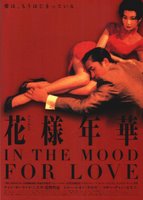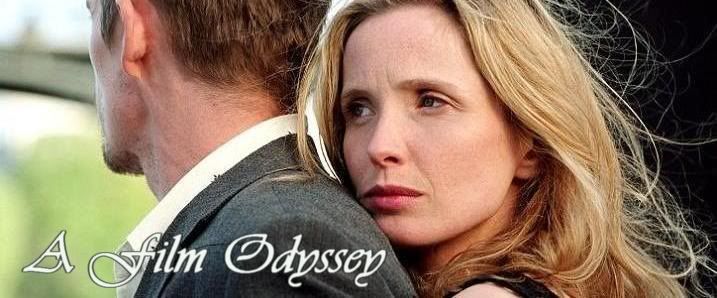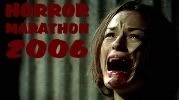 In the Mood for Love
In the Mood for Love is a film of hallways, doors, mirrors and archways; these are the architectural structures that simultaneously make up and constrict our lives, and it is within this plethora of oppressive frameworks that its two main characters must vie for their right to exist as free beings of choice and emotion. They are Mr. Chow (Tony Leung Chiu Wai) and Mrs. Chan (Maggie Cheung), two neighbors who slowly realize that they’ve both been shunned by their spouses, who are routinely away at the same times, their betrayal always felt but never seen. The unfaithful remain permanently off-screen while the damaged seek comfort for their shared pain in the presence of one another. Vowing to not be like their adulterous partners, they bind emotionally but merely skirt around each other physically, their feelings like a boiling liquid vying to escape its enclosed container. Wong Kar-Wai isolates these characters from the rest of the world much in the way their emotions have them utterly unto themselves; any interaction with others is almost purely routine, their shared presence but lack of tangible connection making up the film’s ravishing soul. Mind you, however, the visual constructs made up by the film’s maze-like attentiveness to architectural detail is a far cry from the generic “broken mirrors” and “rails as prison bars” metaphors. The presence of these elements is both passive and completely saturating; take them away, and these characters would exist in but an empty space. Paired with the seductively tantalizing soundtrack,
In the Mood for Love takes on the status as a poetic mosaic of sight, sound, and bodily language, both literally and figuratively timeless as it unfolds with an aching sense of restraint. I think it worth mentioning that the film's ravishing construct sent my body into alternating fits of chills, helpless aesthetic delirium, and absolute breathlessness. The unfulfilled desire is as tender and pulsating as life itself, and it’s ravishing, voluptuously artistic dance suggests the mounting ecstasy of sex freed from the clumsiness of the physical.




 In the Mood for Love is a film of hallways, doors, mirrors and archways; these are the architectural structures that simultaneously make up and constrict our lives, and it is within this plethora of oppressive frameworks that its two main characters must vie for their right to exist as free beings of choice and emotion. They are Mr. Chow (Tony Leung Chiu Wai) and Mrs. Chan (Maggie Cheung), two neighbors who slowly realize that they’ve both been shunned by their spouses, who are routinely away at the same times, their betrayal always felt but never seen. The unfaithful remain permanently off-screen while the damaged seek comfort for their shared pain in the presence of one another. Vowing to not be like their adulterous partners, they bind emotionally but merely skirt around each other physically, their feelings like a boiling liquid vying to escape its enclosed container. Wong Kar-Wai isolates these characters from the rest of the world much in the way their emotions have them utterly unto themselves; any interaction with others is almost purely routine, their shared presence but lack of tangible connection making up the film’s ravishing soul. Mind you, however, the visual constructs made up by the film’s maze-like attentiveness to architectural detail is a far cry from the generic “broken mirrors” and “rails as prison bars” metaphors. The presence of these elements is both passive and completely saturating; take them away, and these characters would exist in but an empty space. Paired with the seductively tantalizing soundtrack, In the Mood for Love takes on the status as a poetic mosaic of sight, sound, and bodily language, both literally and figuratively timeless as it unfolds with an aching sense of restraint. I think it worth mentioning that the film's ravishing construct sent my body into alternating fits of chills, helpless aesthetic delirium, and absolute breathlessness. The unfulfilled desire is as tender and pulsating as life itself, and it’s ravishing, voluptuously artistic dance suggests the mounting ecstasy of sex freed from the clumsiness of the physical.
In the Mood for Love is a film of hallways, doors, mirrors and archways; these are the architectural structures that simultaneously make up and constrict our lives, and it is within this plethora of oppressive frameworks that its two main characters must vie for their right to exist as free beings of choice and emotion. They are Mr. Chow (Tony Leung Chiu Wai) and Mrs. Chan (Maggie Cheung), two neighbors who slowly realize that they’ve both been shunned by their spouses, who are routinely away at the same times, their betrayal always felt but never seen. The unfaithful remain permanently off-screen while the damaged seek comfort for their shared pain in the presence of one another. Vowing to not be like their adulterous partners, they bind emotionally but merely skirt around each other physically, their feelings like a boiling liquid vying to escape its enclosed container. Wong Kar-Wai isolates these characters from the rest of the world much in the way their emotions have them utterly unto themselves; any interaction with others is almost purely routine, their shared presence but lack of tangible connection making up the film’s ravishing soul. Mind you, however, the visual constructs made up by the film’s maze-like attentiveness to architectural detail is a far cry from the generic “broken mirrors” and “rails as prison bars” metaphors. The presence of these elements is both passive and completely saturating; take them away, and these characters would exist in but an empty space. Paired with the seductively tantalizing soundtrack, In the Mood for Love takes on the status as a poetic mosaic of sight, sound, and bodily language, both literally and figuratively timeless as it unfolds with an aching sense of restraint. I think it worth mentioning that the film's ravishing construct sent my body into alternating fits of chills, helpless aesthetic delirium, and absolute breathlessness. The unfulfilled desire is as tender and pulsating as life itself, and it’s ravishing, voluptuously artistic dance suggests the mounting ecstasy of sex freed from the clumsiness of the physical.





Such a beautiful film. Amazing storyteller, I'd have to say that Wong Kar Wai is one of the few directors whose work I'll buy or sign up for sight-unseen.
I've enjoyed your re-vamp, by the way.
Posted by Mob |
12:19 AM
Mob |
12:19 AM